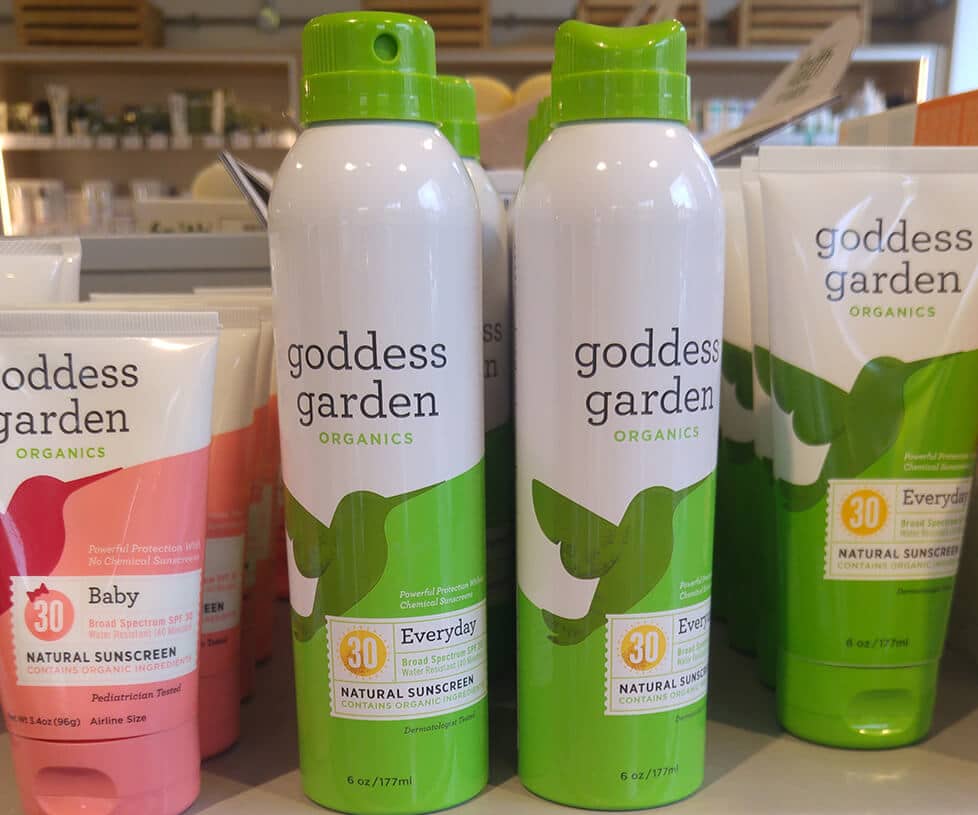Every year when the sun comes out we at Infinity’s Bodycare section know what’s coming – lots of questions and concerns about safe exposure to the sun, and what is the best sunscreen to use!
Everyone knows protecting your skin from the sun’s harmful rays is a must. Whilst some sun is beneficial to health, too much unprotected exposure can lead to serious damage. We’ve all been wearing sunscreen now for decades, but new research is coming out all the time about the safest methods of protecting our skin, in terms of our own health, but also the health of the environment.

One of the questions we’re most frequently asked is ‘what’s the difference between ‘mineral’ and ‘chemical’ sunscreens?’
Sunscreens can be broadly categorised as either chemical, which are absorbed into the skin and which absorb ultra-violet rays, or physical (mineral), which sit on top of the skin and reflect UV rays.
When exposed to the sun, two types of ultra-violet radiation are of concern: short-wave UVB rays, which are more intense and are the primary cause of sunburn (B for Burning), and long-wave UVA rays, which penetrate the skin more deeply and are the dominant tanning, and ageing, ray (A for Ageing).
Research is emerging now to show that the widely used chemicals in typical sunscreen brands can have hormone disrupting effects, including on marine life as it is washed off in the sea. They are also implicated in coral bleaching.
There are also concerns about ‘nano-particles’ when it comes to mineral ingredients. These are minerals like zinc or titanium oxide which have been milled so finely they become microscopic, and are able to be absorbed into the body. The jury is out on whether this can definitely cause damage long term, but the good news is that there is a choice that contains neither of these ingredients, and still protects you from harmful rays. A study done by the Environmental Working Group found that consumers using sunscreens without zinc oxide and titanium dioxide were being exposed to an average of 20% more UVA radiation, with associated health impacts. They were also being exposed to a greater number of hazardous ingredients through the use of chemical sunscreens, and concluded “on balance, EWG researchers found that zinc and titanium-based formulations are among the safest, most effective sunscreens on the market based on available evidence.”*
What about SPF?
Customers often notice that there’s not a huge range of high factor products, with most sunscreens going no higher than SPF30. This has a lot to do with good sun-safe advice: it’s reapplication that is the best, most responsible strategy when it comes to sun exposure. There can be a tendency for people who use SPF50 sun lotions to reapply less frequently and stay in the sun longer than when they use lower factor sun lotions. This can dramatically increase your risk of sun damage because in order to get good UVA defence, you must regularly top up your protection no matter what the factor.

What does SPF mean anyway?
People often forget that SPF is a unit of TIME, not protection. Each skin type has its own natural protection time, after which you will start to burn. People with extremely sensitive skin can react more to the sun, people with darker skin tones usually have a longer natural protection time. An SPF simply prolongs the time you can stay in the sun reducing the risk of getting sunburn.
The following formula may be used as a rough guide:
Skin’s own protection time x sun protection factor (SPF)
For example, for fair skin this means; approx 10 mins. x SPF50 = 500 minutes of safe sun exposure**
**This is not the amount of time 1 application of suncream will last, but the maximum amount of time you should spend in the sun per day while reapplying suncream as needed.
This formula applies to all sun protection factors. Once you have reached your sun exposure limit it is advisable not to expose the skin to the sun even though more cream may have been applied.
At Infinity we won’t stock products containing mineral oils, parabens or SLS/SLES, microbeads or microplastics, and our policy is to never knowingly sell any products that contain unsustainable palm oil or derivatives. Of course everything is strictly cruelty free, and safe for marine life too. Two of the brands are certified vegan, and there’s no nano particles in any we stock!
We are always on the look-out for the best sun care products. We think it’s possible to make a choice that’s effective, safe, and completely eco-friendly, for all the family. Here is our guide to the four brands of sun protection we sell, and the differences between them.
*Source: EthicalConsumer.org



